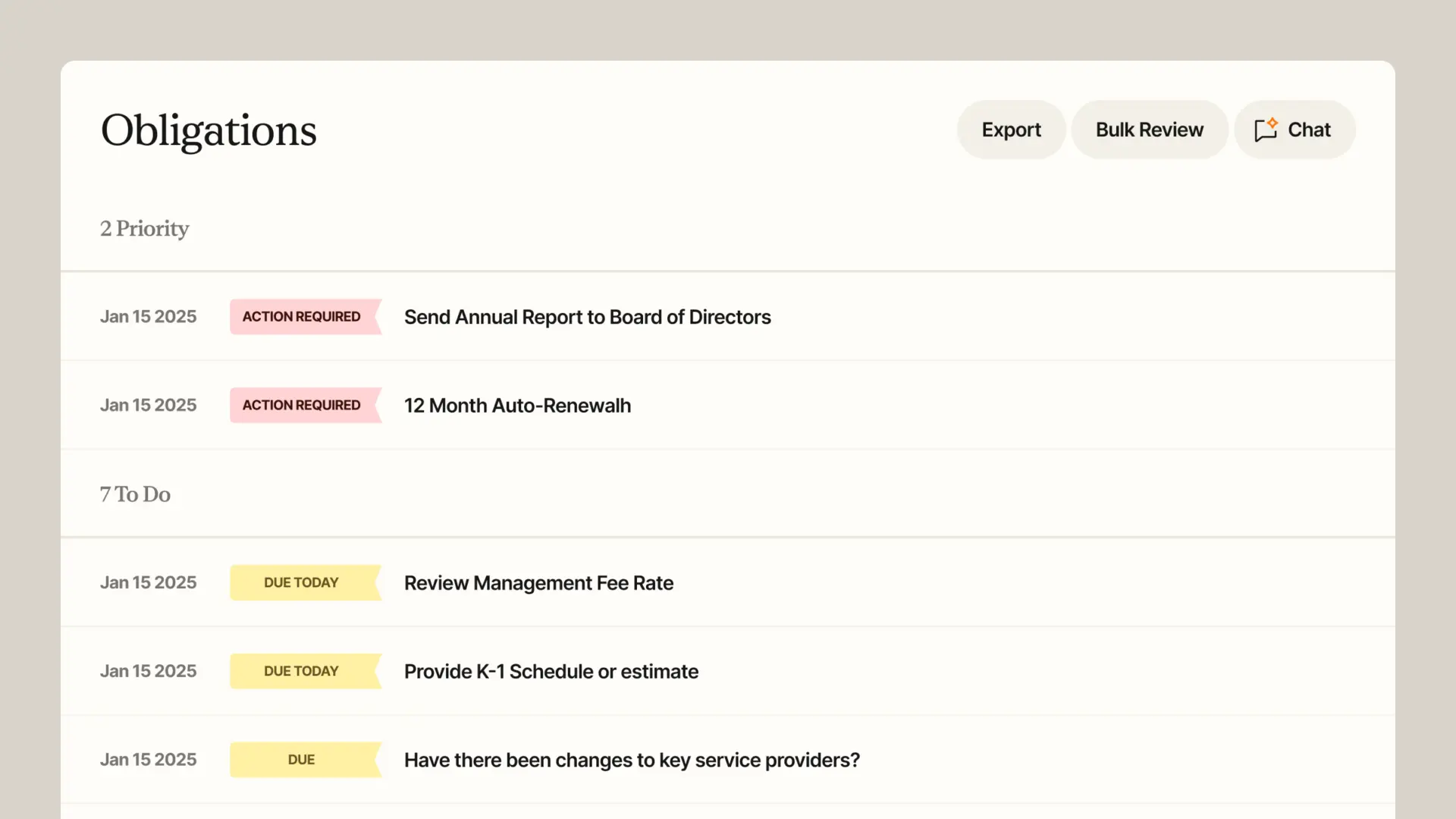So long CLMs: It’s time for something smarter
June 19, 2025

If you work in legal ops or lead a legal team, you’ve likely felt the pain: too many legal documents, too little visibility. You're not alone. Businesses everywhere are sitting on thousands of agreements they barely understand—locked away in PDFs, scattered across folders, or sitting in outdated systems.
Contract Lifecycle Management (CLM) platforms promised a fix. But the truth is, they didn’t deliver. Most CLMs were built to manage workflow, which means they lack the ability to help you understand your documents. They help you track approvals and manage templates—but they can’t tell you what is in your documents.
The Legal Intelligence Platform (LIP) changes that by helping you to understand what’s in your documents, with ease. It’s designed to give you instant insight into your legal documents, without relying on slow, manual review. And that opens the door to something far more powerful: business decisions driven by real legal intelligence. If CLMs helped you get to a contract signature, LIP helps you go beyond that to extract lasting value from the contract after signature.
CLMs tried to help—but fell short
CLMs made sense when they first came along. Centralised storage, approval tracking, e-signature integrations. They ticked a lot of boxes for process and compliance.
But the real value isn’t the workflow. It’s the words. The obligations, the renewal dates, the payment terms, the liability caps. That’s what your business needs to see—and fast.
With most CLMs, if you wanted to know when a vendor agreement auto-renewed, you still had to open the PDF, read the clause, and make sense of it yourself. Even the best CLMs relied on humans to tag documents with metadata—an endless task that never quite kept pace with business needs.
The legal team isn’t the problem. The system is.
Right now, if someone in finance wants to know when a contract renews, or if the sales team wants to know which territories are covered in a franchise agreement, they ask legal. Legal reads the contract, pulls out the info, and passes it on.
It works but it’s slow and expensive, and it keeps legal stuck answering questions instead of focusing on strategic work.
The problem isn’t the team. It’s the fact that the knowledge in those legal documents is trapped. The legal team must manually extract information every time someone asks for it. There’s no way for the rest of the business to self-serve.
That’s where the Legal Intelligence Platform (LIP) comes in.
Legal documents are business assets
Think about it. Every department touches legal documents. And every document contains valuable business data.
- Finance needs to manage payment terms that could affect cash flow.
- Procurement has to track vendor SLAs and performance clauses.
- HR needs visibility into employment agreements and compliance risks.
- Sales wants to explore exclusivity clauses or territorial restrictions.
- Operations plans based on office lease terms and obligations.
The problem isn’t a lack of data—it’s a lack of access to data. Most of it is buried in Word files and scanned PDFs. Even if you have a CLM, it’s probably not showing you the full picture.
That’s where the Legal Intelligence Platform changes the game.
Large language models (LLMs) can read, summarise, and compare documents with an accuracy that rivals junior lawyers. That’s a huge leap forward, and what makes this shift so powerful isn’t just the AI itself. It’s how that AI is used. In a Legal Intelligence Platform, LLMs work behind the scenes to:
- Read and index your legal documents
- Pull out key terms like dates, obligations, and parties
- Let you search across thousands of documents in plain English
- Compare terms across agreements
- Flag anomalies or risks
And crucially, it doesn’t need perfect data to get started. You don’t have to tag every clause manually. The AI handles it for you—at speed, and at scale.
Why now?
Let’s face it—this isn’t just a legal problem. It’s a business problem.
Companies are dealing with new regulations in every market, a rise in cybersecurity risk, pressure to cut costs and do more with less, greater competition for every deal, and volatile supply chains and shifting workforces, among other issues.
When your business environment moves fast, you need to know exactly what you’ve agreed to—and where the opportunities (or risks) lie. That means understanding what’s in your documents. All of them.
AI finally makes that possible—accurately, securely, and without huge implementation costs.
Is this a CLM?
No. It’s not a CLM, a DMS, or a document repository. It’s something new.
CLMs help you get a contract to signature. LIP helps you make use of it after signature.
It’s not trying to replicate approvals workflows or version control. It’s focused on helping you answer business-critical questions across your legal documents, instantly.
That means:
- No tagging metadata manually
- No digging through folders for your documents
- No legal bottlenecks for routine questions
And unlike CLMs, LIP is powered by the latest generation of language models. That makes it more flexible, faster to implement, and dramatically more useful.
It plays well with others
Already using a CLM? Great. LIP can sit alongside it.
You don’t have to rip and replace your tech stack. The platform integrates with tools like:
- SharePoint and Google Drive – to ingest documents
- CLMs and CRMs – to surface data where you already work
- Word and Outlook – to help lawyers draft and review with context
You can start small, prove the value, and scale when you’re ready.
What you get: Key capabilities
The Legal Intelligence Platform gives you a powerful set of tools from day one:
1. Legal Library - A smart, searchable home for all your legal documents. It automatically cleans up duplicates, remembers what each contract contains, and lets you search using plain language—not just keywords.
2. Workspaces - Custom dashboards for projects or teams. You can filter, track, and collaborate on contracts, or keep sensitive projects—like M&A or employment matters—secure and separate.
3. Obligations Management - No more missed deadlines or hidden commitments. The platform extracts key obligations from contracts, sets reminders, and assigns tasks automatically, replacing messy spreadsheets.
4. Content Integrations - Ask legal questions and get answers backed by law. The platform pulls from both your contracts and trusted legal sources—like case law or compliance databases—and cites the authority behind every answer.
5. AI-Powered Editing - The AI suggests edits based on your internal standards and past contracts, helping you stay consistent and negotiate with confidence.
Final thought: The problem isn’t legal. It’s legacy.
The legal function has been stuck with tools that were never built for real insight. CLMs promised a lot, but they weren’t designed for what businesses truly need: visibility, access, and speed.
The Legal Intelligence Platform is a clean break from those limitations. It gives you a smarter foundation—one that’s designed from the ground up to unlock the value inside your legal documents.
This isn’t just about fixing a legal workflow. It’s about turning legal documents into a source of competitive advantage.
And it’s about time.

